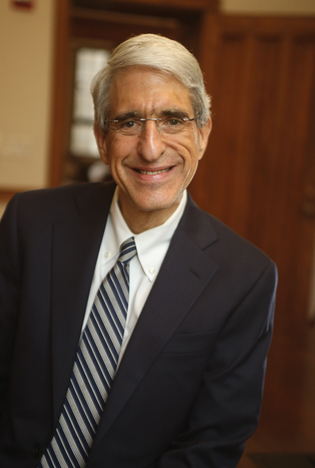
Mark Ostow
The Yale Alumni Magazine publishes a letter from President Peter Salovey ’86PhD in every issue. In this letter, he touches on how “the humanities help lead us during times of uncertainty.”
View full image
Dear Friends,
As I write, the spring semester is about to begin, and I find myself reflecting on milestones we celebrated in the fall term. I have written to you recently about many of them, including the launch of the Jackson School of Global Affairs and the bicentennial of Yale Divinity School. In this message, I focus on the opening and dedication of Yale’s Humanities Quadrangle (HQ).
HQ, formerly the Hall of Graduate Studies (HGS), has been a hub for the humanities at Yale since it was completed in 1932. Until the renovation, it housed apartments for doctoral students, a few humanities doctoral programs, and administrative headquarters for the Graduate School of Arts and Sciences.
Thousands of Yale doctoral students have walked their printed dissertations by hand to an office in this building, thereby completing their journey to a doctorate degree. I was one of them. When I was completing my doctoral research in Yale’s psychology department in the 1980s—although we were housed on Hillhouse Avenue—I was routinely in HGS and crossed paths often with preeminent scholars and thinkers in the humanities.
These people influenced me profoundly. Legendary figures on our campus at that time included Professor Charles T. Davis, then chair of the Afro-American studies program; the poet and translator Marie Borroff ’56PhD, Sterling Professor of English; the historian of art and architecture Sterling Professor Vincent Scully ’40, ’49PhD; the logician Professor Ruth Barcan Marcus ’46PhD; and the American historian Professor G. Gaddis Smith ’54, ’61PhD. Enriching conversations with them and many others exposed me to ways of seeing and understanding the world that are very different from the data-driven approaches psychologists and other social scientists like me applied in our daily work.
HQ now gathers 15 humanities departments into a single hub encouraging collaborative scholarship and learning. Its transformation increased the size of the original building by about 13,000 square feet, all underground. Each floor, once divided into dead-end sections, can now be traveled from one end to the next without retracing one’s steps, creating an easier flow among rooms. The building represents, in a physical way, our longstanding commitment to cross-disciplinary connection; and it better serves the mission of the humanities that it houses.
What, then, is that mission? As I engage on behalf of Yale with people around the world, I find that many are feeling quite lost. They are concerned about the health of the world and worried about whether their children’s lives will be safer and more prosperous than their own. I find that what comforts people in these moments of despair is understanding—from books that explain complex histories, articles that interpret a particular political issue, or a poem that captures the feeling of the moment. By teaching the skills of communication, analysis, and interpretation that are necessary for understanding, the humanities help lead us during times of uncertainty.
At the dedication of HQ, I mentioned a Yale College 2021 graduate named Brian Reyes, who majored in history. A first-generation college student from New York and the son of Dominican immigrants, Brian is a current Rhodes Scholar at the University of Oxford completing his master of philosophy in comparative social policy. He plans to take his humanities education out into the world to work on policy and legal aspects of justice. Yale alumni such as Brian are building on our great tradition of excellence in the humanities to better our shared future.
For over 300 years, Yale has educated and prepared students to serve the world, and its faculty has created knowledge that benefits humanity. As we look forward, Yale’s multidisciplinary approach, grounded in the humanities, can best address today’s complex challenges. The humanities form a core area for strategic investment at Yale. This academic year, there are about 30 ladder faculty searches at all ranks across the humanities. These searches build on existing preeminence in English, history, philosophy, and the modern languages. And they expand our leadership in African American, Islamic, Persian, and South and Southeast Asian studies.
It is heartwarming to think of my early experience at Yale—what I learned from the scholars I met and the humanistic ideas I encountered. Today, it is equally gratifying that the aesthetic grace of Yale’s new humanities hub is matched by the excellence of the teaching, research, and collaboration within it.
With my warmest wishes,
Peter Salovey ’86PhD
President
Chris Argyris Professor of Psychology
 loading
loading